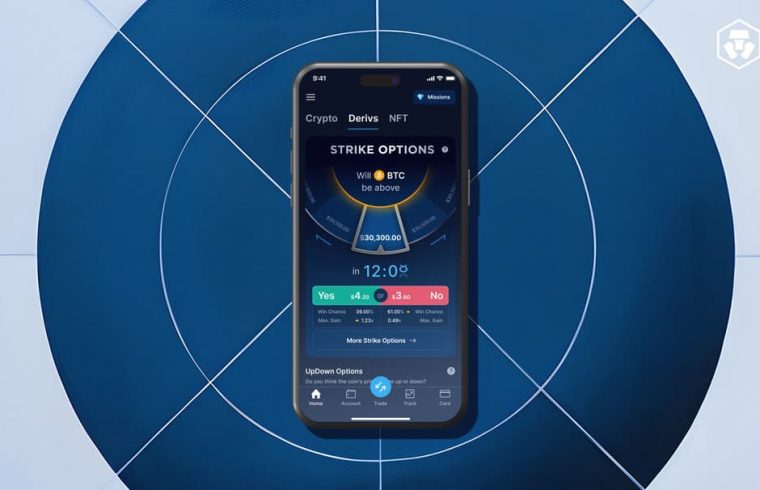Just yesterday, Crypto.com unveiled a fresh product that emulates the features of binary options trading. The derivative vehicle offers traders the potential to achieve predetermined profits contingent upon the cryptocurrency prices at specified moments. But is this an opportunity or a risky gamble?
The new product, called Strike Options, offers a fast-paced form of trading with contract durations as short as 20 minutes. Interestingly, Crypto.com’s new product is regulated by the Commodities Futures Trading Commission (CFTC) and is accessible to its U.S. customers.
This article provides a brief overview of the fusion of binary options and cryptocurrencies, taking into account their historical context rife with scams and the largely unregulated environment in which they both operate.
Regulation Overview
At their core, binary options are deceptively simple – a kind of financial betting. Traders predict whether a market will rise or fall, with a fixed reward for a correct guess and a complete loss for a wrong one. But how does this simplicity play out in the complex world of financial markets, especially when combined with the erratic nature of cryptocurrencies?
The regulatory status of binary options trading can be summarized in the following key points.
- Regulation in the US: NADEX (North American Derivatives Exchange) is indeed a regulated binary options exchange in the United States. It operates under the oversight of the Commodity Futures Trading Commission (CFTC), providing a platform for traders to engage in binary options trading. Additionally, the Chicago Mercantile Exchange (CME) has introduced similar products approved for trading, maintaining compliance with US regulatory standards.
- Restrictions on Foreign Binary Options: In the US, foreign binary options brokers are generally prohibited from soliciting US clients unless they are regulated and authorized by US regulatory bodies like the CFTC.
- Ban in Some European Countries: Several European nations have imposed bans or stringent regulations on binary options trading due to concerns about investor protection. The conflicts of interest between brokers and clients, coupled with insufficient avenues for recourse, have raised red flags about the inherent risks involved in binary options trading.
- Lack of Regulation and Risks: Unregulated binary options brokers, prevalent in many regions, operate without oversight from government or regulatory authorities. This absence of oversight raises concerns about the lack of investor protection, fraudulent activities, and conflicts of interest between brokers and clients.
Crypto Options Trading Platforms
Binary options, often likened to gambling due to their inherent risks, had long been part of the unregulated, online retail trading world. Their fusion with the volatile world of cryptocurrencies isn’t entirely new. Traditional binary options platforms jumped on the crypto bandwagon during its boom. Now, crypto-native firms are entering the fray.
Let’s have a quick look at top crypto exchanges offering binary options-like products.
Crypto.com
Features simplified American options for BTC and ETH, regulated by the CFTC and available exclusively to US investors. The platform offers UpDown contracts with minimal fees and allows up to 250 positions. Starting with a low initial cost of $10, Users can predict whether the underlying asset’s price will go up or down, selecting either a “Yes” option if they believe it will increase or a “No” option if they think it will decrease.
PrimeXBT
Called ‘TurboXBT,’ PrimeXBT’s bitcoin-settled synthetic contracts offer specific payoffs of up to 90 percent. However, with durations as short as 5-seconds, 30-seconds, and one-minute, it essentially functions as a gambling tool, straightforward and focused on speculation.
Instead of offering binary options, several other cryptocurrency exchanges have chosen to introduce vanilla options. This includes:
- Binance: Known for its European style USDT options for various cryptocurrencies. Binance stands out for its low fees and security but doesn’t offer options in the US due to regulatory constraints.
- Bybit: Offers European USDC options for BTC and ETH. It has a range of derivatives products, though limited in options contracts. Bybit also provides a demo trading platform but is not accessible to US investors.
- OKX: OKX offers European BTC and ETH options with a demo platform for practice. The platform has a tiered fee structure based on trading volume and OKB holdings.
- Deribit: A dedicated crypto derivatives exchange offering European BTC and ETH options. While intimidating for beginners, Deribit options are not available in the US and only accepts crypto deposits.
Conclusion
Cryptocurrency binary options present a curious blend of digital currency volatility with binary options’ straightforward nature. The allure of fixed outcomes for both wins and losses masks the high-risk nature of these bets. But is it really that simple and are traders truly prepared for this kind of financial rollercoaster?
That said, the regulatory landscape for cryptocurrency binary options is as complex as the trading itself. It’s a high-risk, high-reward game that blurs the lines between investing and gambling. As this new trading method gains traction, one can’t help but wonder whether this is just another risky bet in the vast casino of financial markets?












